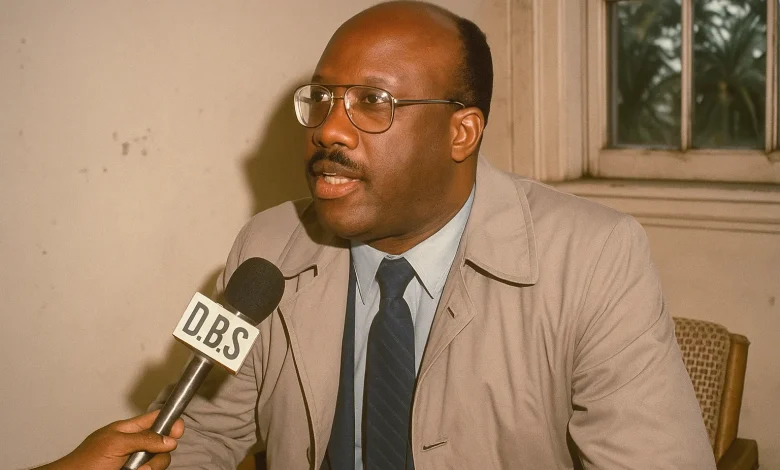Charles Maynard

Charles Maynard (18 January 1934 – 8 May 2012) was a Dominican statesman, cabinet minister, Deputy Prime Minister, and later Ambassador to CARICOM and the OECS. Over five decades, he moved between senior civil service, frontline politics, and regional diplomacy, helping shape Dominica’s public institutions in the turbulent years around independence and during the consolidation that followed.
Early Formation and Entry into National Service
Born in Roseau, Maynard attended Dominica Grammar School before studying at the University of the West Indies, University College of Wales, Aberystwyth, and the University of Oxford. He returned home in the 1960s to a rapidly changing colonial administration and rose quickly in the public service, serving as Permanent Secretary from 1963 to 1970. This grounding in administration, budgeting, personnel, and inter-ministerial coordination became the backbone of his later political career.
During the island-wide political upheaval of 1979, Dominica’s Bloody Tuesday, Maynard joined Oliver Seraphin’s interim administration as Minister of Education. The position placed him inside government at a moment of constitutional strain and social protest; he resigned in January 1980 as the transition to general elections gathered pace. After the Dominica Freedom Party (DFP), led by Dame Mary Eugenia Charles, won the 1980 election, Maynard was invited into the new government, first as a government senator and minister, then as an elected Member of Parliament after 1985. His trajectory captures the bridge from crisis management to institutional rebuilding.
Legislative Representation and Senior Portfolios
In the 1985 General Election, Charles Maynard succeeded Anthony Moise as the Member of Parliament for Soufriere Constituency, entering the second Eugenia Charles administration’s cabinet. His victory solidified his role as one of the Freedom Party’s strongest technocrats, representing a constituency that had become a bellwether for national development policy. During this term, he was assigned key ministerial portfolios, including Education, Health, Agriculture, and Tourism. His management of these areas earned him a reputation for administrative precision and strategic planning, particularly in implementing Dominica’s evolving primary healthcare model and promoting the island’s image as the “Nature Isle of the Caribbean”.
Re-elected in the 1990 General Election, Maynard retained his Soufrière seat and continued to serve as a senior figure in government, maintaining the title of Deputy Prime Minister. His re-election reflected sustained public confidence in his leadership and his steady approach to policy. During this period, he oversaw modernisation programs in the tourism sector and agricultural sector, emphasising the growth of small enterprises and resource management.
By the early 1990s, as Dame Eugenia Charles prepared to step down, Maynard stood for the DFP leadership (1993) but lost to Brian Alleyne. He nonetheless remained one of the party’s senior strategists and continued parliamentary work through the first half of the decade, his legislative service spanning roughly 15 years across appointed and elected roles. The leadership bid underlined his stature within the Freedom Party, even as a new generation prepared to take the reins.
He again contested and won the 1995 General Election, marking his third consecutive parliamentary mandate. Despite the Dominica Freedom Party’s overall electoral decline that year, Maynard remained a central political voice in Parliament. His continued presence through three electoral cycles highlighted his durability and wide respect across party lines. Maynard’s experience placed him among the Freedom Party’s most seasoned and trusted leaders, setting the stage for his later transition into regional diplomacy.
Regional Diplomacy and Ambassadorial Service
After front-bench politics, Maynard moved into regional diplomacy. He was appointed Dominica’s Plenipotentiary Representative (Ambassador) to CARICOM, later also serving as Ambassador to the OECS. CARICOM tributes and regional press at the time of his death noted his impact on integration dialogues and the esteem in which he was held by Secretariat officials. The Government later appointed Felix Gregoire to succeed him in the OECS role, explicitly noting he was replacing the late Ambassador Maynard.
Intellectual Legacy and Public Reputation
Maynard’s breadth of service, as a civil servant, minister, deputy prime minister, and ambassador, was captured in the biography Charles Maynard: A Life in Public Service (launched January 2010) by Irving W. Andre. Coverage of the book and subsequent tributes highlight a career beginning in the 1960s public service, spanning three ministerial decades, and closing in diplomacy, an arc that mirrors Dominica’s own journey from colony to resilient small island developing state. Local media at his passing called his life “a life well lived,” reflecting a reputation for discipline, courtesy, and an unshowy commitment to national duty.
Passing and Assessment
Charles Maynard died on 8 May 2012, aged 78, after a brief hospitalisation. He received an official funeral attended by national leaders and regional dignitaries, recognition for a public career that touched education reform, public health system strengthening, tourism strategy, and the Caribbean integration project. In Dominican political memory, he is often placed among the pragmatic builders, leaders who, after the cauldron of the 1979 crisis, focused on steady institution-building, professional public administration, and credible external partnerships.
Maynard’s importance lies less in headline-grabbing episodes and more in state capacity: he helped professionalise ministries, advance primary health care, and anchor Dominica’s regional voice through CARICOM and the OECS. His career shows how a skilled civil servant can translate administrative craft into cabinet effectiveness and, in turn, into diplomatic leverage, an institutionalist through and through, whose influence persists in the systems he helped strengthen.




